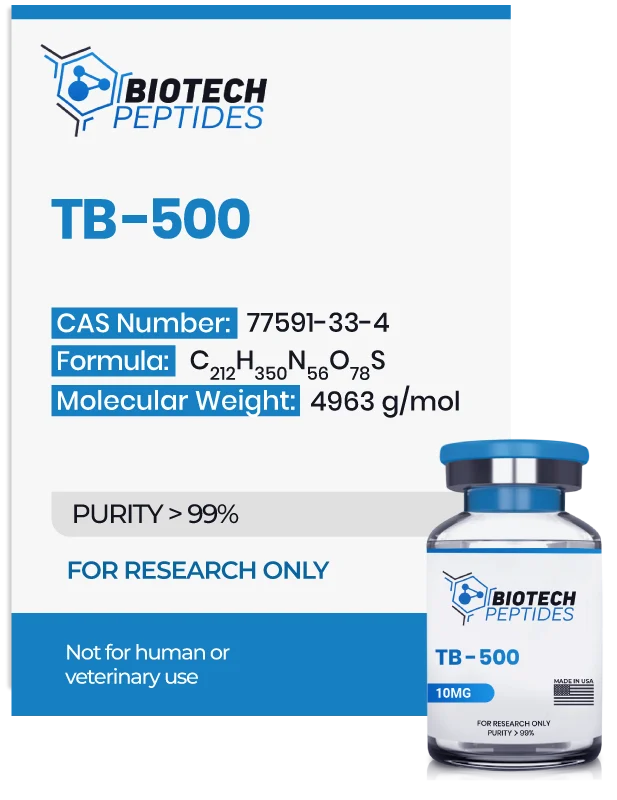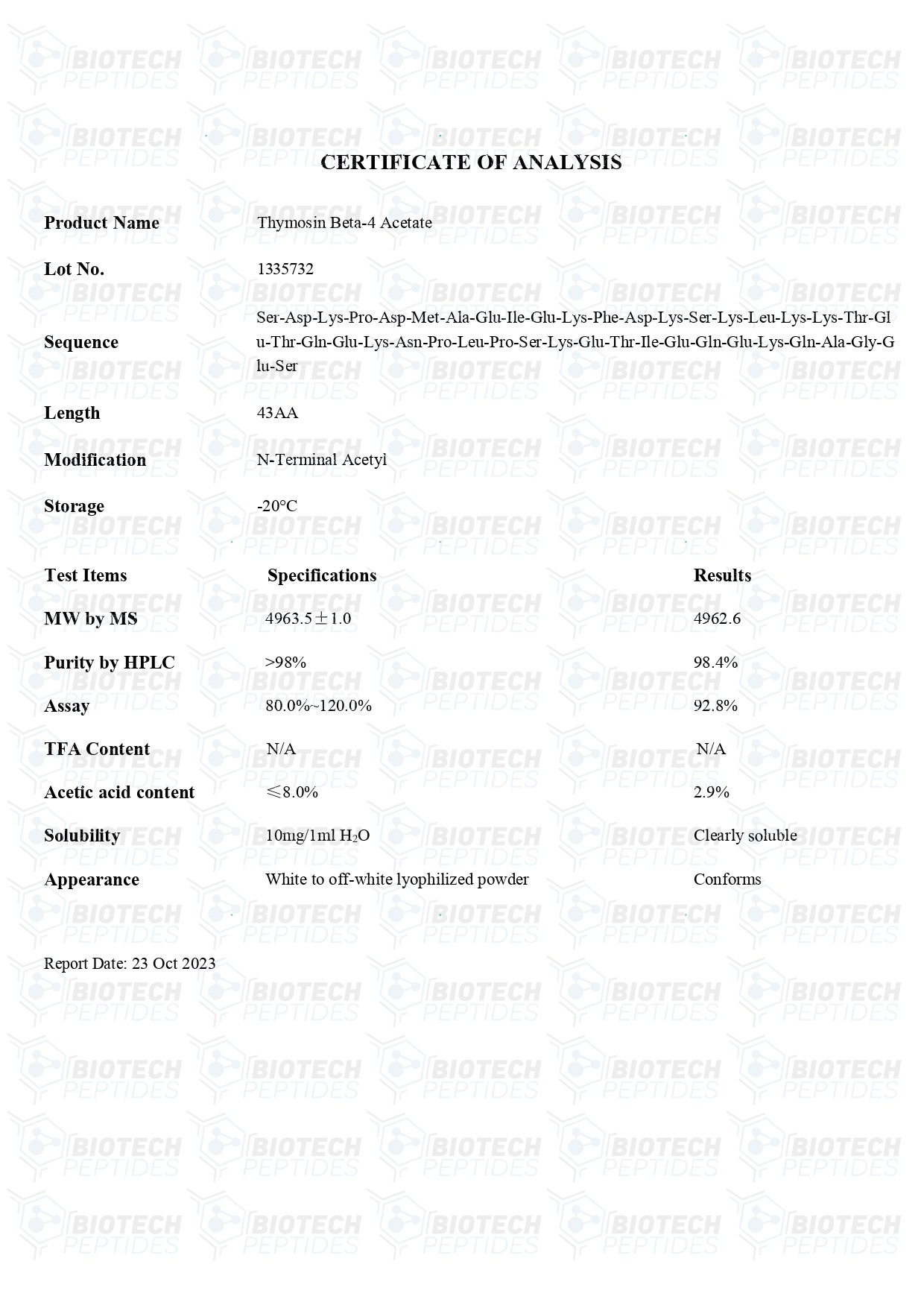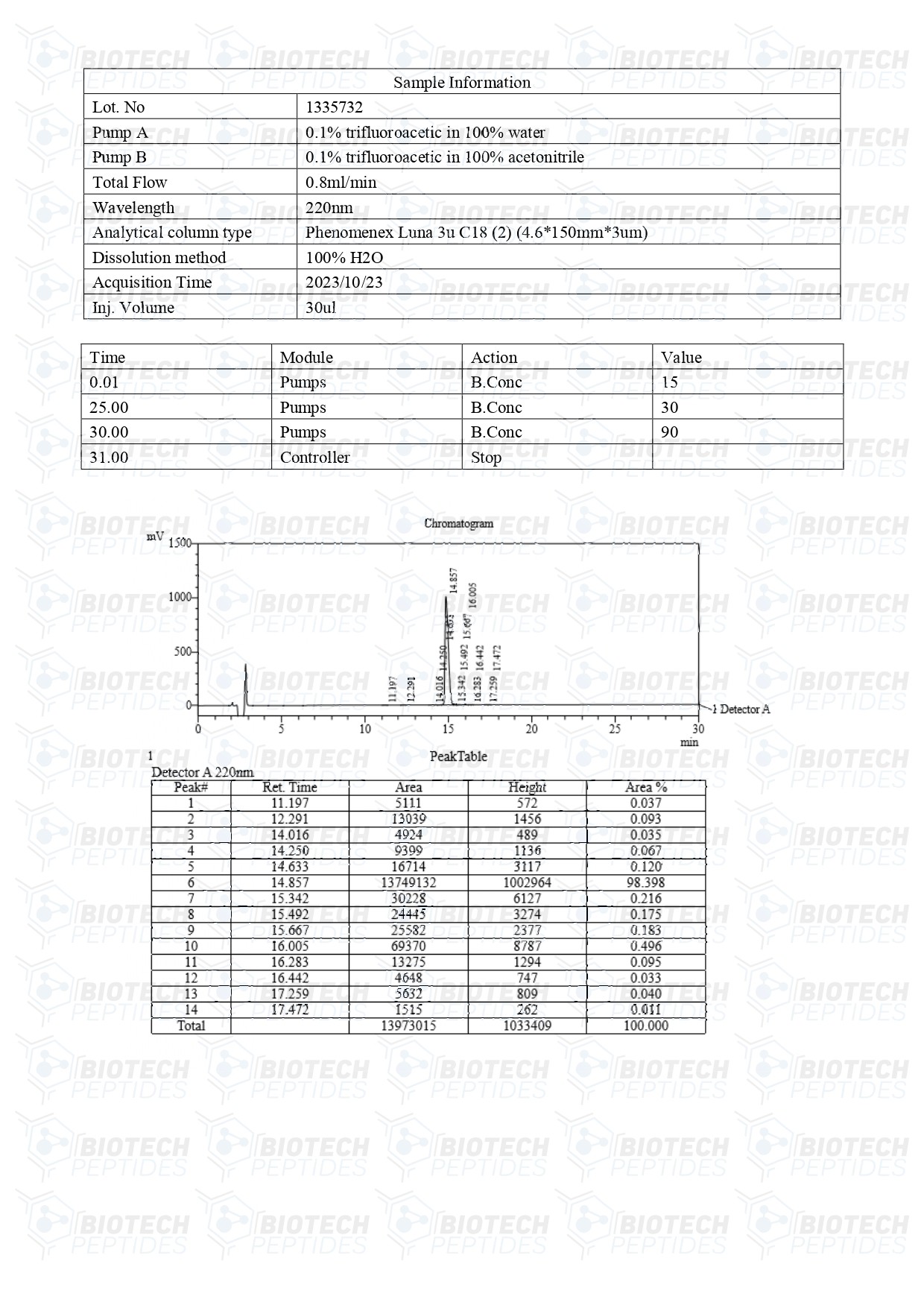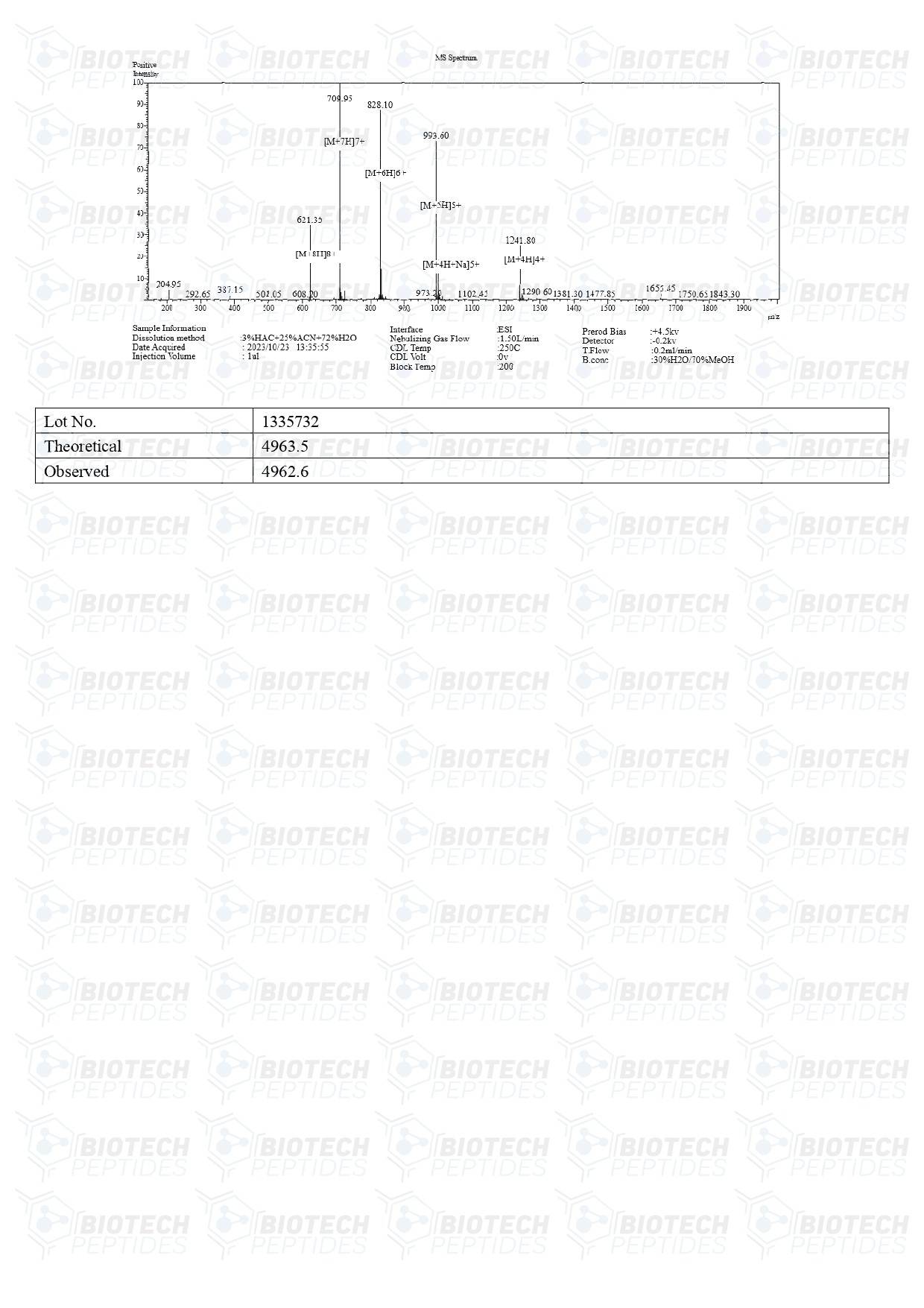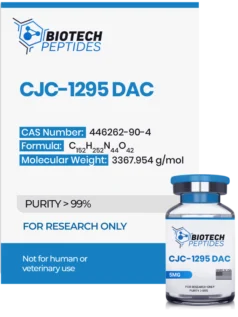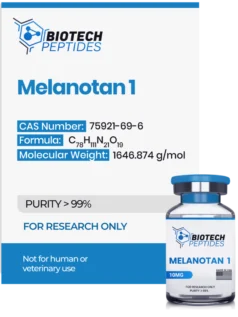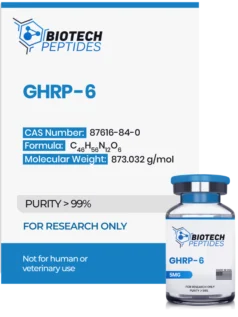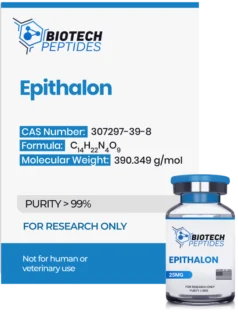TB-500 (Thymosin Beta-4) (10mg)
$119.00
TB-500 peptides are Synthesized and Lyophilized in the USA.
Discount per Quantity
| Quantity | 5 - 9 | 10 + |
|---|---|---|
| Discount | 5% | 10% |
| Price | $113.05 | $107.10 |
FREE - USPS priority shipping
TB-500 (Thymosin Beta-4) Peptide
TB-500, or synthetic Thymosin Beta-4, also known as synthetic Tβ4, is a synthetic analog of the endogenous Thymosin Beta-4 protein, which is considered to be ubiquitously present in cells. The peptide belongs to a widespread family of 16 related molecules observed to exhibit a high degree of sequence conservation and localization in most tissues and circulating cells. TB-500 was developed to sequester and block actin polymerization in eukaryotic cells.
Specifications
Other Known Titles: Thymosin Beta-4
Molecular Formula: C212H350N56O78S
Molecular Weight: 4963 g/mol
Sequence: Ac-Ser-Asp-Lys-Pro-Asp-Met-Ala-Glu-lle-GluLys-Phe-Asp-Lys-Ser-Lys-Leu-Lys-LysThr-Glu-Thr-Gin-Glu-Lys-Asn-Pro-Leu-Pro-Ser-Lys-GluThy-lleGlu-Gin-Glu-Lys-Gin-Ala-Gly-Glu-Ser
TB-500 (Thymosin Beta-4) Research
TB-500 and Intracellular Mechanism of Action
TB-500 is thought to contain a specific peptide sequence, LKKTETQ, located between the 16th and 24th amino acids. This sequence is hypothesized to play a role in mediating binding to actin. Actins are proteins that are considered integral to the cytoskeleton of cells. They appear to maintain the cell's structure and are believed to be critically involved in primary cellular functions such as motility.
TB-500 interaction with actin might occur through the binding to globular actin (G-actin), the monomeric form of actin, before it polymerizes into filamentous actin (F-actin). The speculated interaction between thymosin beta-4 and G-actin is believed to inhibit the polymerization process, known as actin sequestration. This inhibition is likely to result in an increased availability of G-actin.
The potential suppression of F-actin polymerization by thymosin beta-4 might theoretically alter the structure of the cellular cytoskeleton. Such changes may affect the cell's capabilities in terms of movement and undergoing morphological transformations.[1]
TB-500 and Extracellular Mechanism of Action
Initial research indicates that TB-500, beyond its intracellular potential with actin, may also have actions outside the cell that affect various cellular functions. These potential functions may also include cell motility and angiogenesis, the process through which new blood vessels form.[2,3]
It is hypothesized that Thymosin beta-4, the naturally occurring version of TB-500, may facilitate these actions through its influence on ATP synthase enzymes. These enzymes, found on the surfaces of cells, appear to play an essential role in generating the energy required by cells to perform various functions. This hypothesis suggests a potential dual role for Thymosin beta-4 in both cellular structure maintenance and energy production.
TB-500 and Vascular Tissues
TB-500, or Thymosin Beta-4 expression appears to increase four-six fold during early angiogenesis. Research suggests it may promote the growth of new blood cells from existing vessels, potentially mediating faster tissue repair.[4] Researchers point out, "Delineating the molecular pathways impacted by Tβ4 to promote vascular growth and remodeling may reveal novel targets for prevention … of vascular disease.” The actin-binding domain is a short central sequence of amino acids. It appears to be involved in TB-500-mediated regulation of blood cell division, tissue repair processes, migration of endothelial cells and keratinocytes, and possibly higher production of extracellular matrix-degrading enzymes.
TB-500 and Inflammation
TB-500 research suggests the peptide’s potential anti-inflammatory characteristics.[5] The research suggests, “It acts by increasing angiogenesis and cell migration and is currently [studied in] wound repair.” TB-500, unlike other naturally produced growth factors, may possibly support endothelial and keratinocyte migration. It also does not appear to bind to the extracellular matrix, and researchers suggest that its low molecular weight may help it travel comparatively long distances through tissues. Study findings typically hypothesize the action of the peptide may be to regulate the polymerization and function of actin.
Further research suggests that TB-500 may conceivably enhance the expression of microRNA-146a (miR-146a), which may act as an inhibitory regulator of certain cellular communication networks. These networks appear to be particularly involved with inflammation-related cytokines, such as interleukin-1 receptor-associated kinase 1 (IRAK1) and tumor necrosis factor receptor-associated factor 6 (TRAF6). Investigators in a recent study hypothesized this mechanism as a potential mode of action for TB-500, noting that inhibiting miR-146a appeared to have reversed the suppression of IRAK1 and TRAF6 by Tβ4, indicative of a likely anti-inflammatory mechanism.[6]
TB-500 and Tissue Wound Models
It has been suggested that TB-500 may influence cytokine production, potentially speeding up recovery in wound models.[7] After an injury, preliminary data suggests that TB-500 might enhance the expression of interleukin-1β (IL-1β) and interleukin-6 (IL-6) mRNA in the corneal tissues of mice. Post-alkali injury, TB-500 exposure is believed to possibly reduce the levels of chemoattractants like macrophage inflammatory protein-2 (MIP-2) and keratinocyte chemoattractant (KC), which may lead to a reduction in polymorphonuclear neutrophils (PMNs) infiltration. It is also postulated that TB-500 may affect the nuclear factor kappa-light-chain-enhancer of activated B cells (NFκB) signaling pathways in the cornea, potentially manifesting anti-inflammatory actions.
Additionally, TB-500 is thought to exhibit anti-apoptotic characteristics, observed in cellular models where overexpression of TB-500 appears to increase growth rates, reduce basal apoptosis, and enhance resistance to cell death inducers. TB-500 may inhibit apoptosis in corneal epithelial cells by obstructing caspases and limiting the release of the pro-apoptotic protein bcl-2 from mitochondria. The proposed anti-apoptotic mechanism might involve mitigating early cell death signals and activating the survival kinase Akt through interactions with particularly interesting new cysteine-histidine-rich protein (PINCH) and integrin-linked kinase. Consequently, all these potential mechanisms may contribute to TB-500 speeding up recovery in different tissue wound models.
TB-500 and Cell Repair
Initial studies tentatively suggest that TB-500 might enhance the restoration of heart cells in experimental models. It appears that cardiac fibroblasts, connective tissue cells in the heart, may transform into cells similar to cardiomyocytes—these are the muscle cells considered responsible for heart contractions.[8] Additionally, laboratory research has hypothesized that TB-500, combined with cardiac reprogramming techniques, may cooperatively reduce heart cell damage and promote recovery. Researchers suggest this action may be done by stimulating endogenous cells within the heart region.
Further explorative studies in murine models involving ligation (the surgical blockage of coronary arteries) have hinted that TB-500 might elevate the levels of integrin-linked kinase (ILK) and protein kinase B (Akt). Both ILK and Akt are considered critical enzymes in cellular signaling pathways that may play crucial roles in the early survival and repair of cardiomyocytes, thus potentially enhancing the regeneration process of cardiac tissue.[9]
Disclaimer: The products mentioned are not intended for human or animal consumption. Research chemicals are intended solely for laboratory experimentation and/or in-vitro testing. Bodily introduction of any sort is strictly prohibited by law. All purchases are limited to licensed researchers and/or qualified professionals. All information shared in this article is for educational purposes only.
References
- Gurtner GC, Werner S, Barrandon Y, Longaker MT. Wound repair and regeneration. Nature. 2008 May 15;453(7193):314-21. doi: 10.1038/nature07039. PMID: 18480812.
- Huff, T., Müller, C. S., Otto, A. M., Netzker, R., & Hannappel, E. (2001). beta-Thymosins, small acidic peptides with multiple functions. The international journal of biochemistry & cell biology, 33(3), 205–220. https://doi.org/10.1016/s1357-2725(00)00087-x
- Freeman, K. W., Bowman, B. R., & Zetter, B. R. (2011). Regenerative protein thymosin beta-4 is a novel regulator of purinergic signaling. FASEB journal : official publication of the Federation of American Societies for Experimental Biology, 25(3), 907–915. https://doi.org/10.1096/fj.10-169417
- Dubé, K. N., & Smart, N. (2018). Thymosin β4 and the vasculature: multiple roles in development, repair and protection against disease. Expert opinion on biological therapy, 18(sup1), 131–139. doi:10.1080/14712598.2018.1459558
- Philp, D., Goldstein, A. L., & Kleinman, H. K. (2004). Thymosin beta4 promotes angiogenesis, wound healing, and hair follicle development. Mechanisms of ageing and development, 125(2), 113–115. doi:10.1016/j.mad.2003.11.005
- Santra, M., Zhang, Z. G., Yang, J., Santra, S., Santra, S., Chopp, M., & Morris, D. C. (2014). Thymosin β4 up-regulation of microRNA-146a promotes oligodendrocyte differentiation and suppression of the Toll-like proinflammatory pathway. The Journal of biological chemistry, 289(28), 19508–19518. https://doi.org/10.1074/jbc.M113.529966
- Sosne, G., Qiu, P., & Kurpakus-Wheater, M. (2007). Thymosin beta 4: A novel corneal wound healing and anti-inflammatory agent. Clinical ophthalmology (Auckland, N.Z.), 1(3), 201–207.
- Srivastava, D., Ieda, M., Fu, J., & Qian, L. (2012). Cardiac repair with thymosin β4 and cardiac reprogramming factors. Annals of the New York Academy of Sciences, 1270, 66–72. https://doi.org/10.1111/j.1749-6632.2012.06696.x
- Bock-Marquette, I., Saxena, A., White, M. D., Dimaio, J. M., & Srivastava, D. (2004). Thymosin beta4 activates integrin-linked kinase and promotes cardiac cell migration, survival and cardiac repair. Nature, 432(7016), 466–472. target="_blank" rel="noopener"https://doi.org/10.1038/nature03000

